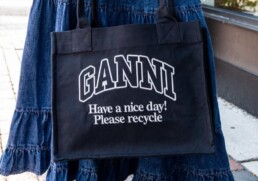Ganni calls on industry peers: “No brand can do this alone”
🇩🇰 Du finder den danske version af denne artikel her.
It’s been an eventful year for the Danish fashion brand Ganni. The company hit a new milestone with annual revenue reaching nearly DKK 902 million – a remarkable achievement for a Danish brand that has managed to stay globally relevant for years.
The financial results are impressive on their own, but what caught our attention even more was Ganni’s extensive Responsibility Report.
These kinds of reports are rarely considered page-turners – but this one stood out. It includes tangible progress and noteworthy figures. We’ve gathered the key takeaways and translated them into a language that makes sense – no ESG diploma required.

Ganni: “We’re fully committed to doing our part – but real progress requires collective action”
In their latest Responsibility Report, Ganni outlines several tangible steps toward their 2027 goal of cutting the company’s carbon footprint in half. Since 2021, they’ve reduced total emissions by 24%, with a 28% drop specifically in emissions related to garment production. A major contributor to this progress is the phase-out of virgin leather – previously one of the brand’s biggest climate offenders.
At the same time, Ganni has scaled up its Fabrics of the Future program. Five innovative materials are now integrated into collections – up from just one the year before. On the supplier side, 63% of workers in the supply chain now receive a living wage – meaning a salary that covers essential needs like food, housing, and healthcare. The brand aims to reach 100% by 2025.
Internally, 23 employees have joined Ganni’s Carbon Squad – a climate ambassador network working across 16 teams to improve awareness and action around climate and carbon reduction. And at four supplier sites – two in Portugal and two in Italy – solar panels have now been installed, allowing Ganni’s production at those facilities to run on renewable energy.
Ganni sends a clear call to the fashion industry

Lauren Bartley, Chief Sustainability Officer at Ganni, states:
“At GANNI, we’re optimistic about the progress we’ve made toward our 2025 strategy and the tangible impact we’ve seen in sustainability. However, we recognise that the scale of change needed in the fashion industry can’t be achieved by one brand alone. The challenges are significant, and we cannot solve them in isolation. Achieving real, lasting impact will require industry-wide collaboration, particularly in aligning sustainability priorities and accelerating innovation. We are fully committed to doing our part, but the path forward demands collective action. Now is the time to step up, collaborate, and drive the change the industry urgently needs.”
Lauren Bartley’s words on behalf of Ganni can only be interpreted as a clear call for other brands to pick up the pace.
Ganni’s full report is available here.
WEEKLY BRIEF
Culture, business & inspiration – straight from Copenhagen to your inbox. Join 55,500+ subscribers.
We send out updates once a week!


